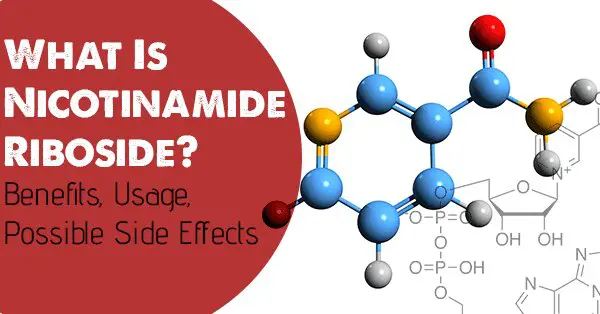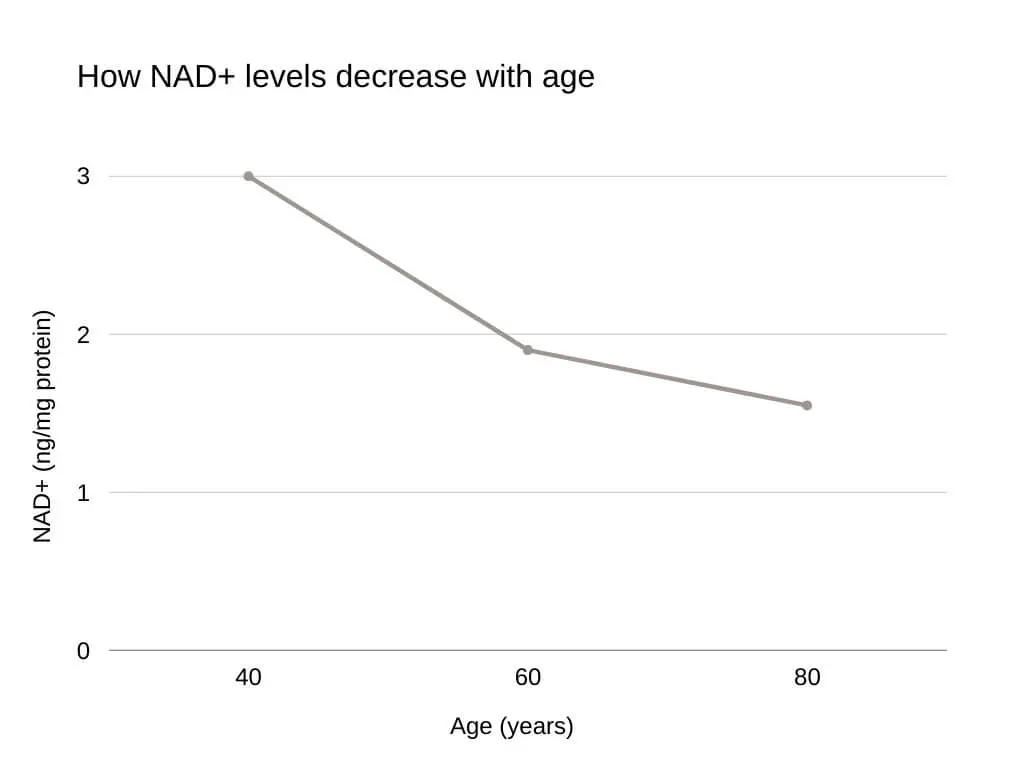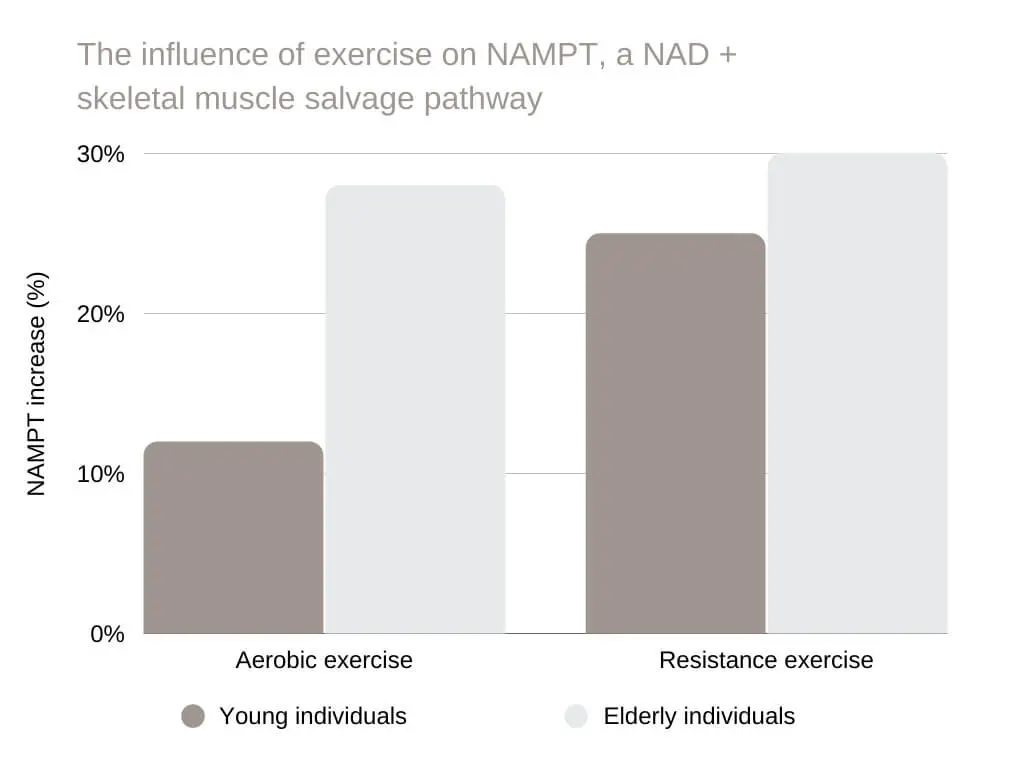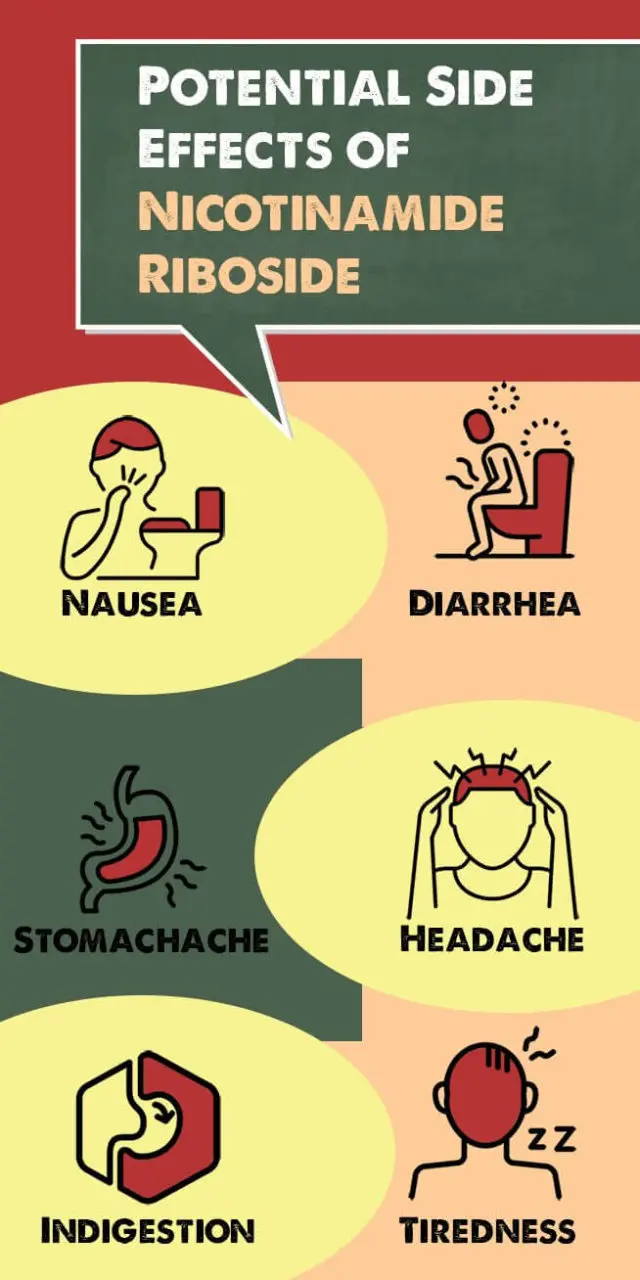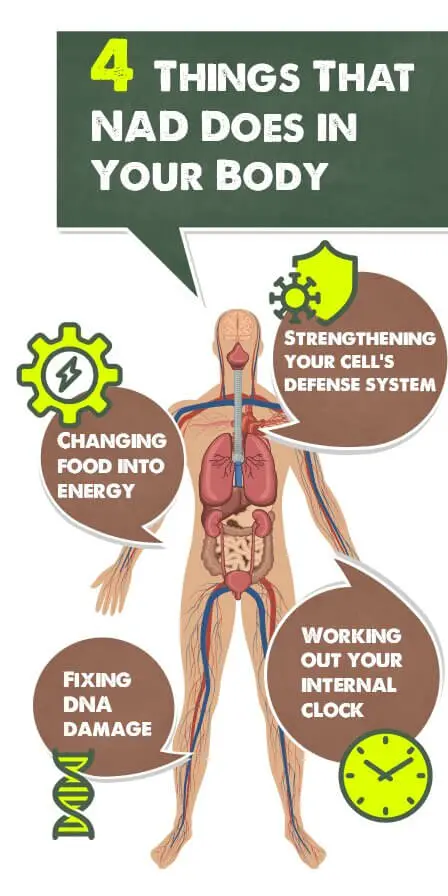There’s a way to fight aging that doesn’t include a lotion, cream, or spa treatment—it’s a way to tackle aging from the inside.
We’re taking a close look at a wonder supplement, nicotinamide riboside, that has made scientists rethink what they know about aging. But is it effective and are there any side effects you should be aware of? Let’s dig in.
Key Takeaways
- Nicotinamide riboside is an alternative form of vitamin B3 that reverses signs of aging.
- As we age we lose an enzyme called NAD+, which both creates energy and builds new cells.
- Supplements that contain nicotinamide riboside are able to increase the amount of NAD+ in your body.
- Besides fighting the effects of aging, increased levels of NAD+ may also fight many diseases associated with getting older.
What Is Nicotinamide Riboside?
Simply put, nicotinamide riboside is an alternative form of vitamin B3. And, just like vitamin B3, it is a NAD precursor. This means it’s naturally converted into nicotinamide adenine dinucleotide, also known as NAD.
NAD levels tend to decrease as you age. Sadly, this is exactly when it’s needed the most.
At what age do you think NAD+ levels in the body begin to decline?
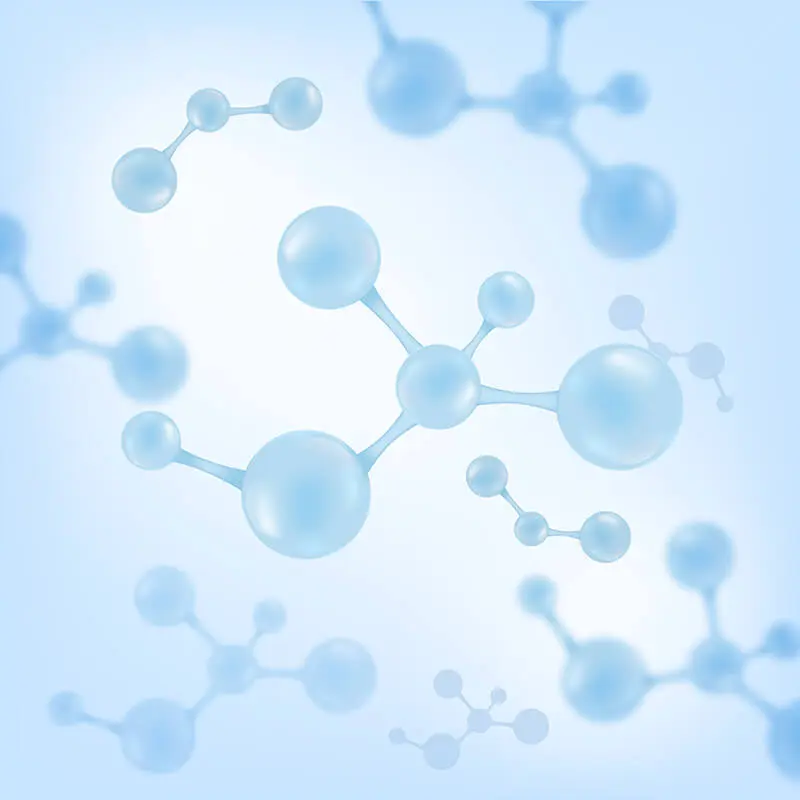
Nicotinamide adenine dinucleotide has a profound effect on the way your body rebuilds itself. Our body is constantly replacing the cells that make up things like tissues, organs and blood.
As you age, the cells you create are inferior to cells created by younger bodies. But what if your cells actually acted as thought you were younger than you really are? The new cells you create would be as healthy as those produced by younger people.
NAD levels are documented to restore this function to cells, and virtually reverse your genetic age.
What type of exercise do you think would most increase your NAD levels?
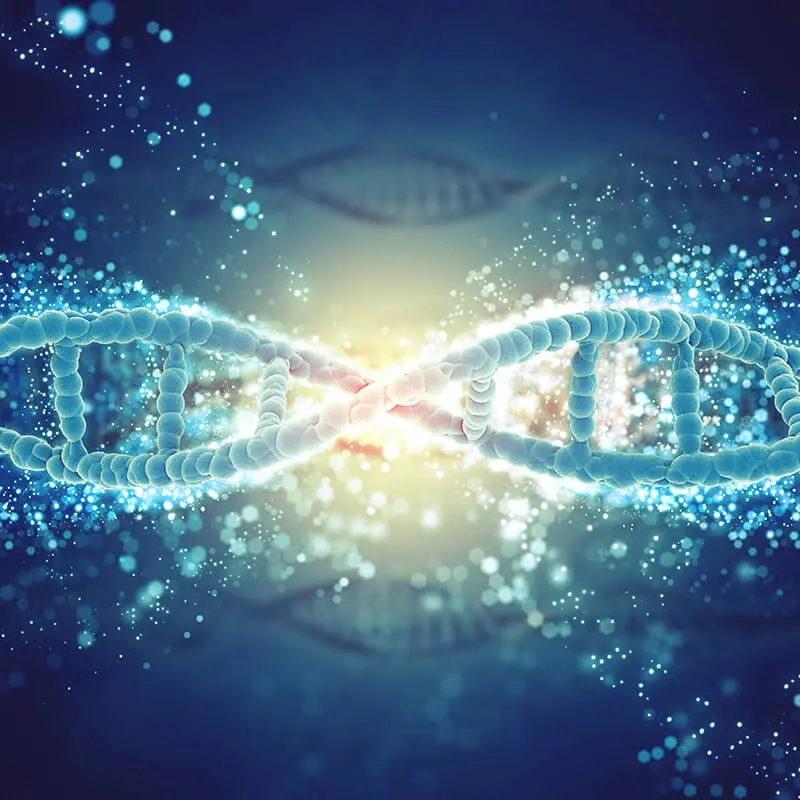
NAD Precursors
Nicotinamide riboside isn’t the only NAD precursor. Nicotinic acid, nicotinamide and nicotinic mononucleotide are also under the umbrella name of niacin or vitamin B3. The amino acid tryptophan is also linked to high NAD production [1].
Potential Benefits of Nicotinamide Riboside
Because nicotinamide riboside battles aging at the cellular level, it can potentially give relief to more serious illnesses, like cancer, Alzheimer’s disease and other age-related ailments [2].
Let’s take a closer look at how that works:
1. Protects Brain Cells
Nicotinamide riboside, as a NAD precursor, has shown benefits for brain cells. It has been shown that the presence of nicotinamide riboside helped with Alzheimer’s Disease and cognitive function [2]. Other clinical trials found similar results regarding Parkinson’s Disease and other neurodegenerative diseases [3].
These are preclinical studies, so most scientists have used animals, like mice, to see these results. At present, there are many aspects about using this on humans that we don’t yet know. More studies are needed.
2. Promotes Healthy Aging
When we have increased NAD levels in our bodies, they can activate certain enzymes. One such enzyme type is sirtuins. In preclinical studies, this enzyme appears to improve health in animals and also extends their lives [4].
Sirtuins have been shown to repair damaged DNA, which increases your resistance to stress and keeps down inflammation.
It has been demonstrated that NAD is also a regulator of gene expression. In case you’re wondering, this is the process of reading genetic material and from that creating the molecule you need. Think of it as the building blocks of our bodies [2].
3. Converts Into NAD+
As mentioned, nicotinamide riboside is a NAD+ precursor and clinical studies carried out using human blood samples have had positive results. They reported an increase in human blood NAD at a rate of 2.7 times after just one dose of nicotinamide riboside. That’s almost triple.
The study also mentions that human subjects given progressively higher doses of nicotinamide riboside showed an increase in NAD in a dose-dependent manner. Meaning the increase mirrored the amount of nicotinamide riboside they took. Suggesting that a high dose means a higher level of NAD [5].
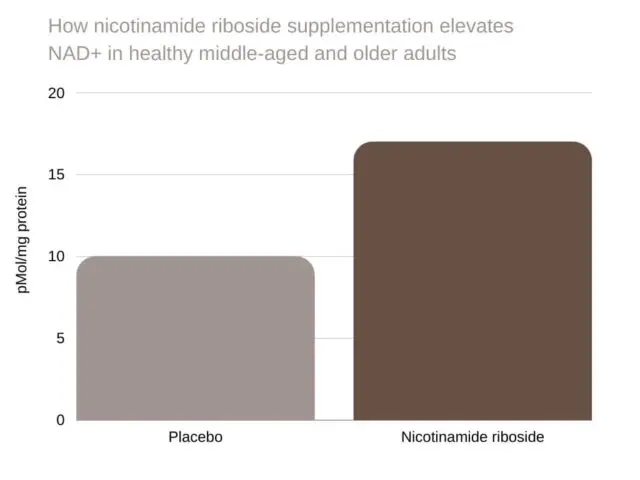
Source: https://www.nature.com/articles/s41467-018-03421-7
Lowers the Risk of Heart Disease
It was discovered that nicotinamide riboside supplements have a positive effect on vascular dysfunction. Vascular dysfunction refers to issues with your large arteries and they can lead to diseases of the heart and brain—common among our aging population [6].
Vascular dysfunction leads to several types of abnormalities in the functioning of blood vessels and, in turn, can promote the development of cardiovascular diseases like heart attacks and angina.
Another benefit is a reversal of oxidative stress, which is a disorder caused by many things including obesity, smoking, alcohol, medications, and even pollution [7].
Scientists believe that oxidative stress promotes the development of various diseases. These include chronic conditions such as Alzheimer’s disease, ADHD, Parkinson’s disease, and depression [7].
If nicotinamide riboside can reduce or get rid of oxidative stress, imagine the increase in quality of life for many of our older residents.
However, most of these results are from clinical studies into heart disease using animals and not humans. Before we get a definitive answer, we need more human trials.
4. Aids Weight Loss
In preclinical studies, lab mice got thinner after taking in nicotinamide riboside. Lab mice were given nicotinamide riboside and it reduced abdominal visceral fat deposits. These fat deposits are very harmful and can lead to type two diabetes, insulin resistance, heart disease, and some cancers [8].
A negative correlation between levels of NAD and body weight and fat mass was found in some studies. A negative correlation means when one number goes up, the other goes down. Meaning, the more NAD in your body, the less body weight and fat mass [8].
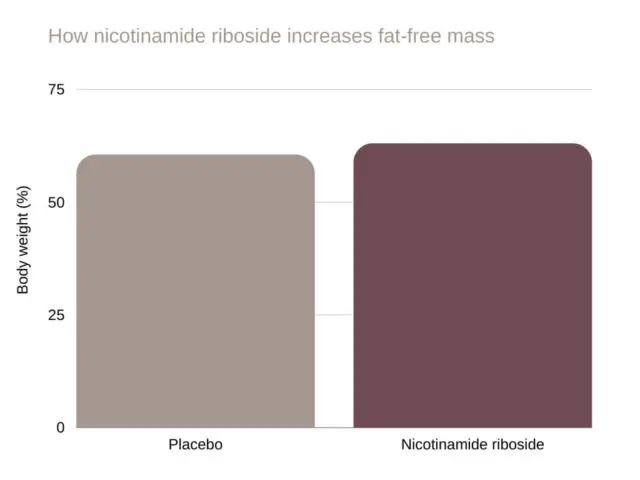
Source: https://academic.oup.com/ajcn/article/112/2/413/5823793
Another thing that nicotinamide riboside does is alter your metabolism—essentially giving your body energy and strength to work harder, helping you lose unwanted body fat.
Using supplements consisting of nicotinamide riboside can help to raise HDL cholesterol levels—that’s the good cholesterol. It also, if you suffer from high cholesterol, has shown to lower the bad cholesterol [9].
It sounds too good to be true, but we haven’t talked about the big one yet: cancer.
5. May Lower Your Risk of Cancer
Increasing the amount of NAD in the body, using nicotinamide riboside, could be part of a strategy for getting rid of tumor-initiating cells (TICs). TICs are exactly what they sound like. They are cells that are able to renew themselves and have the ability to create tumors. Meaning, fewer tumors could equal fewer opportunities of getting cancer [10].
Note the use of the word “could.” To be sure of these effects, we need more human testing.
Another benefit of nicotinamide riboside is for patients who already have cancer. It can help in their recovery, as it has been revealed that an increase in NAD had a positive effect on primitive stem cells. Because of this, nicotinamide riboside may be able to help cancer patients who are recovering from chemotherapy and radiotherapy [11].
Side Effects and Potential Risks of Nicotinamide Riboside
Individuals who take therapeutic doses of 1,000-2,000 mg each day found they had no effects that were harmful [12]. Take note though, these studies were short-term, and so long-term effects could be different.
Few individuals felt moderate side effects, which included:
- Nausea
- Diarrhea
- Stomachache
- Headache
- Indigestion
- Tiredness
Nicotinamide Riboside Supplements
Once you’ve decided you want to give nicotinamide riboside a try, you’ve got to find the NAD supplement that’ll work best for you. Check out your local health food store or online retailers like Amazon.
But let’s look at how much to take and what to expect to find inside the supplement.
Recommended Dosage
The brands that sell nicotinamide riboside generally recommend between 250 and 300 mg daily—usually one or two capsules, but that will depend on the brand you choose.
Common Ingredients
Most nicotinamide riboside supplements contain mostly nicotinamide riboside. There are some manufacturers that mix in ingredients like Pterostilbene, an antioxidant that many people already take for increased health benefits.
Other Sources of Nicotinamide Riboside
It’s always a good idea, before embarking on a regime of dietary supplements, to find out if what you’re getting out of the supplement can also be found in common foods. This way it would just be a change of diet in order to get similar results as the supplement.
Foods That Boost NAD Levels
What foods are already able to raise your NAD levels? Well, there are quite a few, and most of them are considered healthy eating already:
- Fish, like tuna and salmon, are rich sources.
- Mushrooms, especially crimini can boost your levels.
- Green vegetables, especially peas and asparagus are also on the list—but you’re better off eating them raw.
Not many foods actually contain nicotinamide riboside. However, you can find trace amounts in three places:
- Cow’s milk
- Yeast
- Beer [12].
Another, and much less popular, way to boost your NAD levels is fasting. Intermittent fasting or taking on a low-carb diet is better than a drastic reduction in calories. For best results, do your fasting in moderation.
FAQ
Maybe you still have questions—below are some of the most common queries about nicotinamide riboside.
What Does Nicotinamide Riboside Do?
Nicotinamide riboside increases the amount of NAD in your body. NAD is a coenzyme that we lose as we get older.
Some of the things that NAD does in your body include:
- Strengthening your cell’s defense system
- Changing food into energy
- Working out your internal clock
- Fixing DNA damage
Is NR Safe?
No human trials have found anything but mild side effects. These side effects included nausea, diarrhea, stomach and headache, indigestion, and tiredness.
But you should note that the tests were only short-term. We won’t know about any long-term effects until we can do long-term testing.
Does Nicotinamide Increase NAD Levels?
Yes. A study found that after a single dose of nicotinamide riboside NAD levels can almost triple the levels of NAD in human blood [5].
Human testing has also revealed that the increases in the blood NAD+ are dose-dependent—they go higher with a higher dose.
Do Nicotinamide Riboside Supplements Really Work?
Nicotinamide riboside definitely raises the level of NAD in your body. But the real question is: do increased amounts of NAD actually reverse the aging process? The thing is, you won’t know if these supplements work until you define what “working” means.
These supplements don’t operate on a quick-fix basis. Taking a nicotinamide riboside supplement changes your metabolism, but there is no evidence that you’ll see any changes in your appearance from these products.
Because they work on your metabolism, these supplements are more likely to make you feel younger than look younger. They may also reduce the risk of disease and illness often associated with the aging process.
Does Niagen Prevent Diabetes?
No, unfortunately, after a 12-week supplement regimen in doses of 2000 mg, a study found there was no improvement in obese, insulin-resistant male volunteers [13].
What Are the Ingredients in Tru Niagen?
Tru Niagen is a supplement that promises to raise your NAD levels. The ingredients in each capsule are 300 mg of Niagen, which is their patented product. Each 300 mg of Niagen contains 263 mg of nicotinamide riboside. The other ingredients, which are inactive, are microcrystalline, and hypromellose—these are both commonly used in medicines.
Does Niagen Raise Blood Pressure?
Because Niagen contains nicotinamide riboside, there is some evidence that suggests that it actually improves blood pressure. Patients with high systolic blood pressure—that’s the first number you get from your doctor—scored 10 points lower after using the supplement.
That 10 point drop in blood pressure is actually pretty impressive. It could translate into a 25% less chance of having a heart attack [12].
This evidence, however, comes from testing what the scientists described as “small and pilot in nature.” Meaning there’s more research needed before we hear any definitive statements about any benefit to blood pressure patients.
How Can I Increase My NAD+ Levels Naturally?
The number one way to raise NAD+ levels naturally is to exercise. This will boost your overall health and also increase the amount of DNA-rebuilding proteins you have in your body. If you exercise daily, your body will produce NAD+ to replace what you used up in your exercise routine.
Avoiding the sun is the second one. Too much exposure to the sun can cause you to deplete your personal stash of NAD+ because you’re using it to repair cell damage.
Restricting the number of calories you consume will also help. Also think about limiting or maybe even, removing alcohol from your diet [14].
Conclusion
First of all, nicotinamide riboside, as a NAD+ precursor, definitely raises the NAD levels in your blood. That has been proven.
For the rest of the claims, you can take more as “possible” benefits. There have been suggestions of benefits to many illnesses, like Parkinson’s and Alzheimer’s disease. There have also been “maybes” regarding preventing cancer, helping cancer patients recover, and improving renal function and mitochondrial function. More studies are needed, however.
In the meantime, it may be a good opportunity to assess how we look at healthy aging. Are we happy with just masking the visual effects? Or are we ready to attack aging from the inside?
References:
- Rodriguez Cetina Biefer, Hector, et al. “Aspects of Tryptophan and Nicotinamide Adenine Dinucleotide in Immunity: A New Twist in an Old Tale.” International Journal of Tryptophan Research : IJTR, SAGE Publications, 14 June 2017, www.ncbi.nlm.nih.gov/pmc/articles/PMC5476425/.
- Gong B;Pan Y;Vempati P;Zhao W;Knable L;Ho L;Wang J;Sastre M;Ono K;Sauve AA;Pasinetti GM; “Nicotinamide Riboside Restores Cognition through an Upregulation of Proliferator-Activated Receptor-γ Coactivator 1α Regulated β-Secretase 1 Degradation and Mitochondrial Gene Expression in Alzheimer’s Mouse Models.” Neurobiology of Aging, U.S. National Library of Medicine, pubmed.ncbi.nlm.nih.gov/23312803/.
- Schöndorf DC;Ivanyuk D;Baden P;Sanchez-Martinez A;De Cicco S;Yu C;Giunta I;Schwarz LK;Di Napoli G;Panagiotakopoulou V;Nestel S;Keatinge M;Pruszak J;Bandmann O;Heimrich B;Gasser T;Whitworth AJ;Deleidi M; “The NAD+ Precursor Nicotinamide Riboside Rescues Mitochondrial Defects and Neuronal Loss in IPSC and Fly Models of Parkinson’s Disease.” Cell Reports, U.S. National Library of Medicine, pubmed.ncbi.nlm.nih.gov/29874584/.
- Grabowska, Wioleta, et al. “Sirtuins, a Promising Target in Slowing down the Ageing Process.” Biogerontology, Springer Netherlands, Aug. 2017, www.ncbi.nlm.nih.gov/pmc/articles/PMC5514220/.
- Trammell SA;Schmidt MS;Weidemann BJ;Redpath P;Jaksch F;Dellinger RW;Li Z;Abel ED;Migaud ME;Brenner C; “Nicotinamide Riboside Is Uniquely and Orally Bioavailable in Mice and Humans.” Nature Communications, U.S. National Library of Medicine, pubmed.ncbi.nlm.nih.gov/27721479/.
- Sloten, T.T. van. “Vascular Dysfunction: At the Heart of Cardiovascular Disease, Cognitive Impairment and Depressive Symptoms.” Artery Research, No Longer Published by Elsevier, 23 May 2017, www.sciencedirect.com/science/article/abs/pii/.
- de Picciotto NE;Gano LB;Johnson LC;Martens CR;Sindler AL;Mills KF;Imai S;Seals DR; “Nicotinamide Mononucleotide Supplementation Reverses Vascular Dysfunction and Oxidative Stress with Aging in Mice.” Aging Cell, U.S. National Library of Medicine, pubmed.ncbi.nlm.nih.gov/26970090/.
- Crisol BM;Veiga CB;Lenhare L;Braga RR;Silva VRR;da Silva ASR;Cintra DE;Moura LP;Pauli JR;Ropelle ER; “Nicotinamide Riboside Induces a Thermogenic Response in Lean Mice.” Life Sciences, U.S. National Library of Medicine, pubmed.ncbi.nlm.nih.gov/30195617/.
- Grover SA;Kaouache M;Joseph L;Barter P;Davignon J; “Evaluating the Incremental Benefits of Raising High-Density Lipoprotein Cholesterol Levels during Lipid Therapy after Adjustment for the Reductions in Other Blood Lipid Levels.” Archives of Internal Medicine, U.S. National Library of Medicine, pubmed.ncbi.nlm.nih.gov/19858435/.
- Son MJ;Ryu JS;Kim JY;Kwon Y;Chung KS;Mun SJ;Cho YS; “Upregulation of Mitochondrial NAD + Levels Impairs the Clonogenicity of SSEA1 + Glioblastoma Tumor-Initiating Cells.” Experimental & Molecular Medicine, U.S. National Library of Medicine, pubmed.ncbi.nlm.nih.gov/28604662/.
- Vannini N;Campos V;Girotra M;Trachsel V;Rojas-Sutterlin S;Tratwal J;Ragusa S;Stefanidis E;Ryu D;Rainer PY;Nikitin G;Giger S;Li TY;Semilietof A;Oggier A;Yersin Y;Tauzin L;Pirinen E;Cheng WC;Ratajczak J;Canto C;Ehrbar M;Sizzano F;Petrova TV;Vanhecke D;Zhang. “The NAD-Booster Nicotinamide Riboside Potently Stimulates Hematopoiesis through Increased Mitochondrial Clearance.” Cell Stem Cell, U.S. National Library of Medicine, pubmed.ncbi.nlm.nih.gov/30849366/.
- SJ;, Lee HJ;Hong YS;Jun W;Yang. “Nicotinamide Riboside Ameliorates Hepatic Metaflammation by Modulating NLRP3 Inflammasome in a Rodent Model of Type 2 Diabetes.” Journal of Medicinal Food, U.S. National Library of Medicine, pubmed.ncbi.nlm.nih.gov/25974041/.
- Dollerup, Ole L, et al. “Randomized Placebo-Controlled Clinical Trial of Nicotinamide Riboside in Obese Men: Safety, Insulin-Sensitivity, and Lipid-Mobilizing Effects.” OUP Academic, Oxford University Press, 10 July 2018, academic.oup.com/ajcn/article/108/2/343/5051210.
- Poljsak, Borut, et al. “Healthy Lifestyle Recommendations: Do the Beneficial Effects Originate from NAD+ Amount at the Cellular Level?” Oxidative Medicine and Cellular Longevity, Hindawi, 12 Dec. 2020, www.ncbi.nlm.nih.gov/pmc/articles/PMC7752291/.
